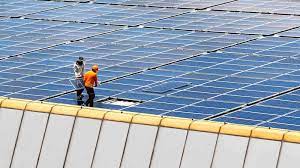Solar Companies For Sale : 5 Dynamic Opportunities

As the global focus on sustainable energy intensifies, the solar industry emerges ” Solar Companies For Sale “as a key player in the renewable energy landscape. With an increasing number of solar companies available for acquisition, this article explores the opportunities and challenges in the market. Whether you’re an investor seeking to enter the renewable energy sector or a company looking to expand, understanding the dynamics of solar companies for sale is essential. This concise guide navigates through crucial factors, trends, and considerations to provide valuable insights for those exploring opportunities in the solar business.
Introduction to the Solar Industry:

The solar industry stands at the forefront of the global shift towards sustainable and renewable energy sources. Characterized by the harnessing of sunlight to generate power, solar energy has become a cornerstone in the fight against climate change. In recent years, the industry has experienced substantial growth, driven by advancements in technology, increased environmental awareness, and supportive government policies.
Solar Power Advancements: Technological innovations have significantly enhanced the efficiency and affordability of solar power. Improved solar panels, energy storage solutions, and smart grid integration have bolstered the viability of solar energy as a mainstream power source. This progress has attracted both consumers and businesses alike, contributing to the industry’s expansion.
Environmental Impact: The environmentally friendly nature of solar power is a major driving force behind its widespread adoption. Solar energy production produces minimal carbon emissions compared to traditional fossil fuels, making it a key player in mitigating the impact of climate change. Governments worldwide are promoting the transition to solar energy as part of their commitment to sustainability and reducing carbon footprints.
Market Growth and Investment Opportunities: The solar industry’s growth is evident in the increasing number of solar companies entering the market. This surge presents lucrative investment opportunities for individuals and organizations looking to capitalize on the rising demand for clean energy solutions. From large-scale solar farms to residential rooftop installations, the diversity within the sector provides various avenues for investment and business expansion.
Government Support and Incentives: Many governments worldwide are incentivizing the adoption of solar energy through subsidies, tax credits, and favorable regulatory frameworks. These initiatives aim to accelerate the transition towards renewable energy and create a conducive environment for solar businesses to thrive. Understanding these government policies is crucial for investors and companies navigating the solar industry landscape.
Market Overview: Trends and Opportunities:
Current Landscape: The solar industry is experiencing a transformative phase, with an expanding global market. The demand for clean energy solutions is driving substantial growth, positioning solar power as a mainstream and essential component of the energy mix. As of [current year], solar power accounts for a significant and increasing share of the global electricity generation capacity.
Trends Shaping the Solar Market:
- Technological Advancements: Ongoing innovations in solar technology, such as higher efficiency panels, energy storage solutions, and advanced inverters, are shaping the market. These innovations improve performance, reduce costs, and enhance the overall feasibility of solar projects.
- Declining Costs: The cost of solar power has seen a remarkable decline, making it increasingly competitive with traditional energy sources. This cost reduction is attributed to economies of scale, improved manufacturing processes, and increased efficiency of solar installations.
- Rise of Solar Storage: Energy storage solutions, such as batteries, are gaining prominence in conjunction with solar installations. This trend addresses the intermittent nature of solar power and allows for more reliable and consistent energy supply, further increasing the attractiveness of solar projects.
- Global Energy Transition: The global push towards renewable energy as a response to climate change is a significant driver for the solar market. Governments, businesses, and consumers are increasingly committed to reducing reliance on fossil fuels, creating a conducive environment for solar companies.
Opportunities in Solar Company Sales:
- Portfolio Diversification: Investors seeking to diversify their portfolios are drawn to the stable and growing returns offered by solar investments. Acquiring solar companies allows for exposure to a sector with long-term sustainability and potential for robust financial performance.
- Market Entry for New Players: As the solar industry expands, there is ample opportunity for new players to enter the market through the acquisition of existing solar companies. This provides a shortcut to establishing a foothold in the industry without the challenges of starting from scratch.
- Strategic Expansion for Existing Players: Established energy companies looking to expand their renewable energy portfolio see the acquisition of solar companies as a strategic move. This not only aligns with sustainability goals but also positions them favorably in a market with growing demand.
Factors Driving the Sale of Solar Companies:
Solar Industry Maturity: As the solar industry matures, companies within the sector may face various factors that drive them towards sales. The life cycle of solar projects and companies often involves initial development, growth, and then a strategic decision regarding their future. Understanding the factors influencing these decisions is essential for potential buyers.
- Consolidation and Competition: The solar industry has witnessed a trend of consolidation as companies seek to strengthen their market positions. Intense competition may lead smaller or less competitive players to consider selling to larger, more established entities looking to expand their market share.
- Financial Considerations: Companies facing financial challenges, whether due to high debt, operational costs, or market dynamics, may opt for a sale as a strategic financial move. This could provide relief to existing stakeholders and allow the business to continue under new ownership.
- Strategic Repositioning: Changes in business strategies or a shift in focus towards other renewable energy sources might prompt a solar company to divest its solar assets. This strategic repositioning could be driven by a desire to align with evolving market trends or capitalize on emerging opportunities in other sectors.
- Ownership Transitions: Succession planning, changes in leadership, or the desire to bring in new expertise are common drivers for the sale of solar companies. Owners may decide to sell to ensure the continued growth and success of the business, especially when faced with challenges related to leadership transitions.
- Portfolio Optimization: Companies with diverse energy portfolios may decide to optimize their assets by divesting certain solar assets. This can be a strategic move to enhance overall portfolio performance, reallocate resources, or streamline operations for better efficiency.
- Regulatory Changes: Evolving regulations in the solar industry can influence a company’s decision to sell. Companies may choose to navigate regulatory uncertainties by selling to entities better positioned to handle and adapt to changing compliance requirements.
Types of Solar Companies Available for Sale:
Diversity in Solar Business Models: The solar industry encompasses a diverse range of business models, each catering to specific market segments and preferences. Potential buyers should be aware of the various types of solar companies available for sale, each presenting unique opportunities and considerations.
- Solar Project Developers: Companies specializing in the development of solar projects, from site selection and permitting to construction and grid connection, may be available for acquisition. Buyers can gain access to a pipeline of projects at different stages of development.
- Solar EPC (Engineering, Procurement, and Construction) Firms: EPC firms handle the design, procurement, and construction of solar installations. Acquiring an EPC firm provides a ready-made capability to execute solar projects, including the expertise to ensure efficient and reliable installations.
- Solar Equipment Manufacturers: Companies involved in the manufacturing of solar panels, inverters, batteries, and other essential components represent another segment available for acquisition. This type of acquisition offers vertical integration opportunities for businesses looking to control their supply chain.
- Solar O&M (Operations and Maintenance) Service Providers: O&M firms focus on the ongoing maintenance and performance optimization of solar installations. Acquiring an O&M company can provide a steady revenue stream and ensure the longevity and efficiency of existing solar assets.
- Solar Financing and Investment Platforms: Companies involved in financing and investment platforms that support solar projects may be available for sale. These entities play a crucial role in securing funding for solar initiatives and may offer opportunities for investors seeking exposure to the financial aspects of the solar industry.
- Distributed Solar Companies: Businesses focused on distributed solar solutions, such as residential and commercial rooftop installations, fall under this category. Acquiring such companies allows buyers to tap into the growing market for decentralized energy production.
Considerations for Buyers:
- Strategic Fit: Buyers should assess how the target solar company aligns with their strategic goals and existing business operations. Compatibility in terms of technology, market focus, and corporate culture is essential for a successful acquisition.
- Regulatory Compliance: Understanding the regulatory landscape applicable to the target solar company is crucial. Regulatory compliance issues can impact the success and viability of the acquisition, making due diligence in this area imperative.
- Project Pipeline and Portfolio Quality: For those acquiring project developers or EPC firms, evaluating the quality and diversity of the project pipeline is vital. A robust and well-balanced portfolio enhances the long-term prospects of the acquired company.
- Technology and Innovation: Assessing the technological capabilities and innovation potential of the target company is important, especially for acquisitions in manufacturing or technology-driven segments. Staying ahead in terms of technological advancements is critical in the dynamic solar industry.
Key Considerations for Buyers:

Strategic Alignment:
- Market Fit: Assess how the acquisition aligns with the buyer’s market strategy. Consider whether the target company operates in geographic regions or market segments that complement existing business goals.
- Technology Integration: Evaluate the compatibility of technologies between the buyer and the target company. Ensure seamless integration and capitalize on synergies to enhance overall operational efficiency.
Financial Due Diligence:
3. Revenue Streams and Profitability: Scrutinize the target company’s revenue streams, ensuring a diversified and sustainable income. Analyze profitability metrics to gauge the financial health and potential returns on investment.
- Debt and Liabilities: Conduct a thorough examination of the target company’s financial obligations, outstanding debts, and potential liabilities. Identifying and understanding these financial aspects is crucial for risk mitigation.
Operational Assessment:
5. Project Portfolio: For companies involved in solar project development, evaluate the quality, size, and stage of the project portfolio. Assess the potential for future revenue generation and the overall health of existing projects.
- Supply Chain and Procurement: Understand the target company’s supply chain, especially for manufacturers and EPC firms. A reliable and efficient supply chain is essential for uninterrupted operations and cost-effective project execution.
Regulatory and Compliance:
7. Regulatory Environment: Stay informed about the regulatory landscape governing the solar industry in relevant jurisdictions. Ensure the target company complies with existing regulations and is well-prepared to navigate any upcoming changes.
- Environmental and Permitting Issues: Assess the target company’s track record in obtaining necessary environmental permits and approvals. Identify any potential issues that may affect ongoing or future projects.
Human Capital and Culture:
9. Workforce Expertise: Evaluate the expertise and experience of the target company’s workforce, especially key personnel involved in project development, engineering, and management. A skilled and knowledgeable team contributes to successful integration.
- Corporate Culture: Consider cultural alignment between the buyer and the target company. A harmonious corporate culture can facilitate a smoother transition and enhance collaboration among teams.
Assessing the Financial Health of Solar Companies:

Financial Metrics and Performance:
- Revenue Growth: Evaluate the historical revenue growth of the solar company to gauge its market traction. Consistent and positive revenue trends can indicate a healthy and sustainable business model.
- Profitability and Margins: Examine the company’s profitability, assessing key financial ratios such as gross profit margin, operating margin, and net profit margin. Strong margins reflect efficient cost management and operational effectiveness.
- Cash Flow Analysis: Analyze the company’s cash flow statements to understand its ability to generate and manage cash. Positive cash flow is essential for sustaining operations, servicing debts, and funding future growth initiatives.
Debt and Financial Obligations:
4. Debt Levels: Assess the level of debt carried by the solar company. High levels of debt could pose financial risks, affecting the company’s ability to invest in new projects or withstand economic downturns.
- Debt Servicing Capability: Evaluate the company’s ability to service its debt obligations. A healthy debt-servicing capability ensures financial stability and minimizes the risk of default.
Project Economics and Asset Quality:
6. Return on Investment (ROI): Examine the historical ROI on completed projects. This metric provides insights into the financial performance of the company’s solar installations and their contribution to overall profitability.
- Asset Longevity: Consider the longevity and performance of existing solar assets. Assess the quality of the company’s project portfolio, including factors such as equipment reliability, maintenance practices, and potential for future upgrades.
Market and Competitive Position:
8. Market Share: Understand the solar company’s market share within its operating regions. A significant market share may indicate a strong competitive position, while a declining share could raise questions about market challenges.
- Competitive Analysis: Evaluate the competitive landscape and the solar company’s positioning relative to peers. Identify key differentiators, such as technology, service quality, or innovative solutions, that contribute to its competitive advantage.
Future Growth Prospects:
10. Pipeline and Expansion Plans: Assess the company’s pipeline of upcoming projects and expansion plans. A robust pipeline indicates future revenue potential and growth prospects, making the company an attractive investment.
Solar Companies For Sale Conclusion
In navigating the landscape of solar companies for sale, understanding the multifaceted aspects of the solar industry, market dynamics, driving factors, and key considerations for buyers is paramount.
The solar sector’s pivotal role in the global shift towards renewable energy presents a myriad of opportunities for investors and businesses alike. From project developers to equipment manufacturers and service providers, the diverse array of solar companies available for acquisition requires a strategic and comprehensive approach.
Success in acquiring a solar company hinges on a meticulous assessment of its financial health, operational capabilities, regulatory compliance, and alignment with the buyer’s goals.
As the renewable energy market continues to evolve, this guide equips potential buyers with the knowledge needed to navigate the complexities of acquiring and integrating solar companies, contributing to the sustainable growth and advancement of the solar industry.
Frequently Asked Questions (FAQs): about Solar Companies For Sale
Q1: Why should I consider investing in solar companies for sale?
A1: Investing in solar companies offers a strategic entry into the booming renewable energy sector. With a growing global emphasis on sustainability, solar energy presents lucrative opportunities for long-term returns and portfolio diversification.
Q2: What types of solar companies are available for acquisition?
A2: Solar companies available for sale vary, including project developers, EPC firms, equipment manufacturers, O&M service providers, distributed solar companies, and financing platforms. The diversity allows investors to choose based on their strategic goals and preferences.
Q3: What factors drive the sale of solar companies?
A3: Several factors influence the decision to sell, including industry consolidation, financial considerations, strategic repositioning, ownership transitions, portfolio optimization, and responses to regulatory changes.
Q4: How can buyers assess the financial health of a solar company?
A4: Buyers should evaluate revenue growth, profitability, cash flow, debt levels, debt-servicing capability, return on investment, asset quality, market share, competitive positioning, and future growth prospects to assess the overall financial health of a solar company.
Q5: What key considerations should buyers keep in mind during the acquisition process?
A5: Buyers should focus on strategic alignment, financial due diligence, operational assessment, regulatory compliance, and human capital considerations. Ensuring compatibility and addressing these aspects contributes to a successful acquisition.
Q6: Are there regulatory considerations in acquiring a solar company?
A6: Yes, understanding the regulatory environment is crucial. Buyers should assess the target company’s compliance with existing regulations and its ability to adapt to potential regulatory changes in the dynamic solar industry.
Q7: How can I identify opportunities for successful solar company acquisitions?
A7: Identifying opportunities involves aligning strategic goals with the target company’s strengths, conducting thorough due diligence, and considering market trends, growth prospects, and potential synergies to ensure a successful acquisition.
Q8: What role do government policies play in the solar industry and acquisitions?
A8: Government policies, including subsidies, tax credits, and favorable regulations, can significantly impact the success of solar companies. Buyers should stay informed about these policies to assess the stability and growth potential of the target company.
Q9: Can I acquire a solar company if I’m new to the renewable energy sector?
A9: Yes, acquiring a solar company can be a viable entry point for newcomers. Thorough research, understanding industry trends, and seeking expert advice are crucial for a successful transition into the renewable energy market.
Q10: What is the outlook for the solar industry and acquisitions in the future?
A10: The solar industry’s outlook remains positive, driven by increasing global demand for clean energy. Acquisitions are likely to continue as companies seek strategic positioning and investors pursue opportunities in the evolving renewable energy landscape.


